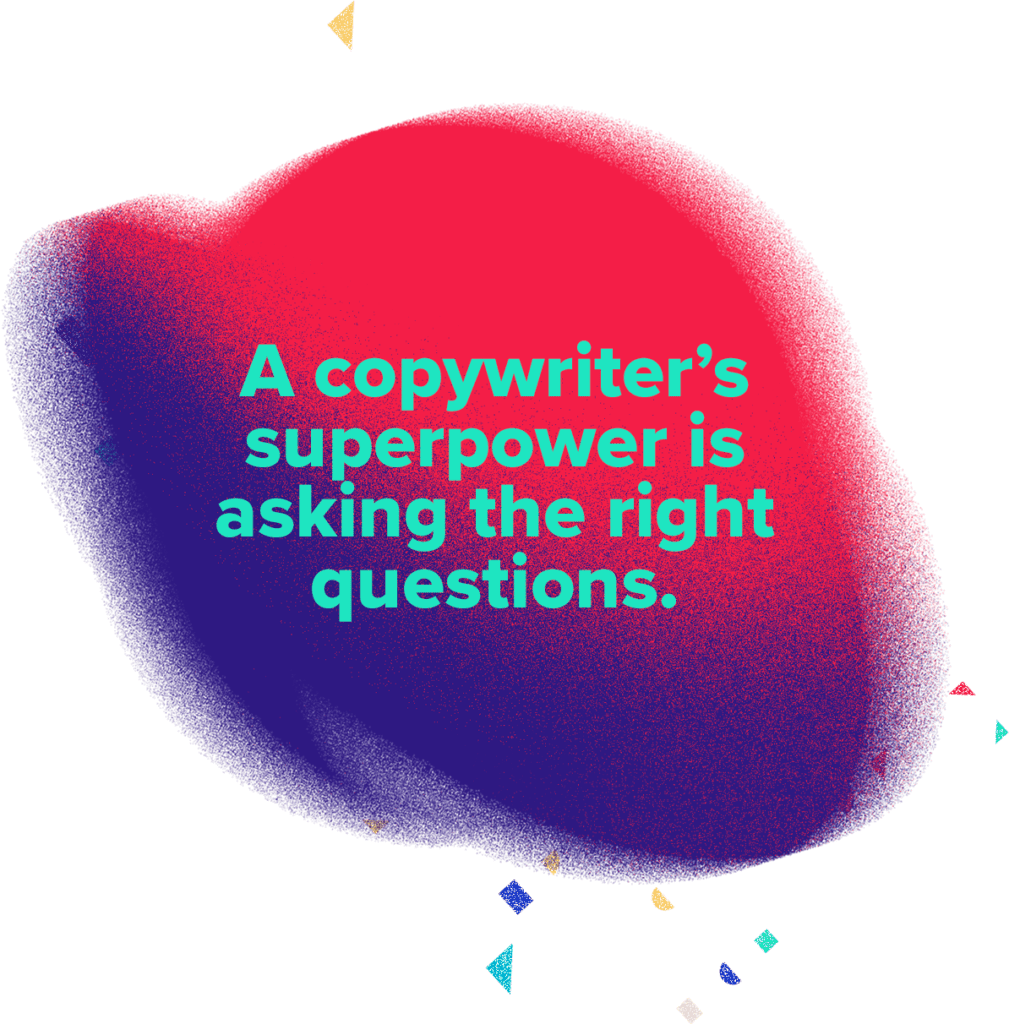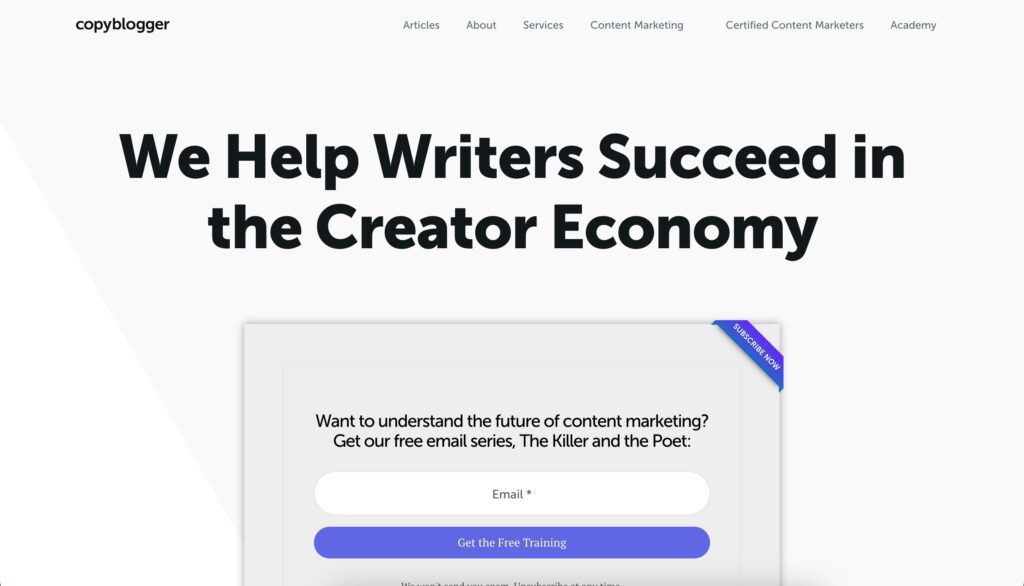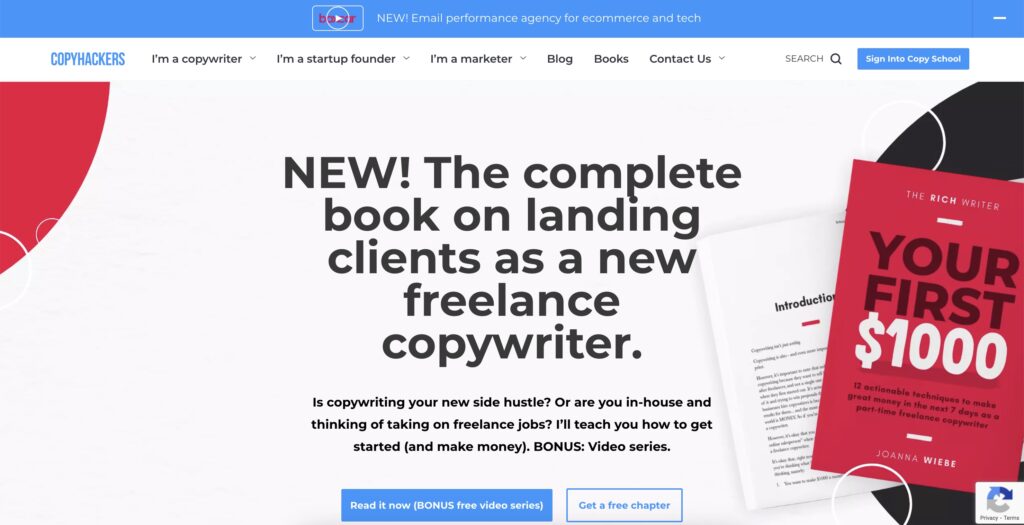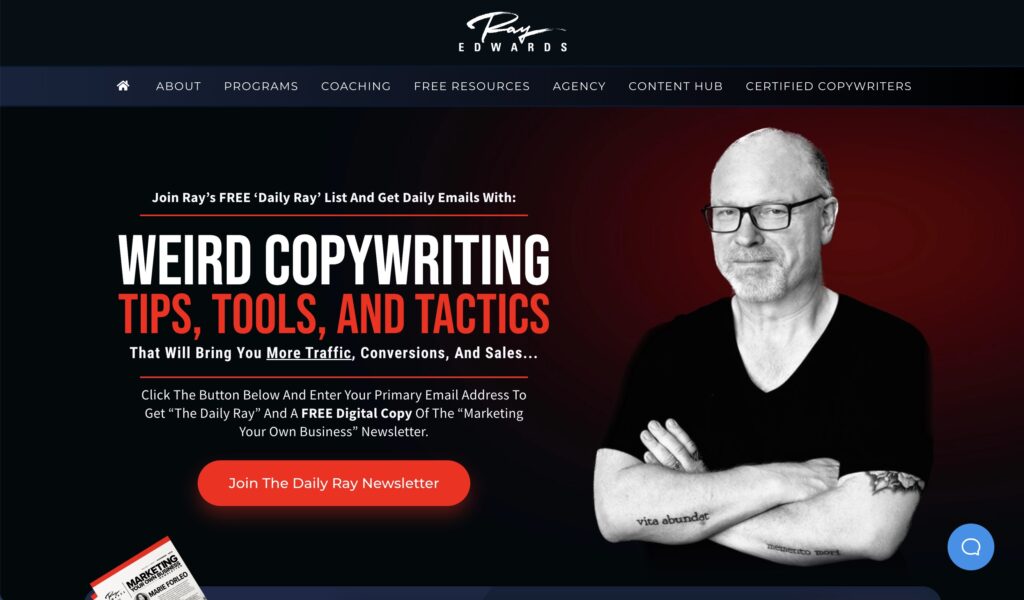Looking to brush up on your copywriting skills? Ready to take your copy conversions to the next level? Any good writer knows the best way to improve their writing is by learning from other writers!
We have compiled a list of the best copywriting blogs to refer to for training, education, examples, techniques, and insights for writing persuasive and compelling copy.
Before you start exploring the list compiled by our copywriting team, it’s important to understand what copywriting is, what makes someone a copywriter, what’s the difference between copywriting and traditional writing, and other copywriting basics.
So let’s get started!
Copywriting – what is it? It is the process of crafting words that persuades or influences an audience, often to take some form of action, such as purchasing a product or service. If you’ve read a sales page, you’ve read copy. If you’ve seen an ad on social media, the caption and script are examples of copywriting.
Copywriting is integral to any business or organization’s success because it is the language you use to drive conversion and sales. Copywriting will bring you leads, engage your existing audience, and help promote awareness of your brand.
You use copywriting when you write emails to your newsletter subscriber base. When you’re creating social captions, that’s copywriting. Sales documents, landing pages, and the button someone pushes to purchase on your site? Those are all copywriting examples, too. The words you use to sell something count as copywriting – it’s foundational to your business’ success to get this right.
Someone who writes copy for a living is called a copywriter. Copywriters help businesses communicate their messages correctly and effectively. This helps brands create relationships with new customers and build trust and awareness around their services, products, or brands as a whole.
Disclosure: When you purchase through links in our articles, we may earn a small commission.
The Difference Between Writing and Copywriting
Writing and copywriting are often confused, and there are key differences that are important to understand, especially if you’re hiring a writer. Not all writers are copywriters – writing copy is a specialized, technical process that requires significant marketing and linguistic training.
Writing is the overall process of composing stories, pieces of information, and ideas into a cohesive and readable form. Copywriting, in contrast, is a subset of writing that focuses explicitly on creating content for marketing and advertising purposes. Copywriting must be direct, efficient, and persuasive in its approach, whereas writing can be more creative and reflective in its focus.
It could be said that Stephen King is a great writer. Ray Edwards is a great copywriter.
Stylistically, there are differences as well. Writing typically follows a specific style and format, adhering to standards such a the Associated Press Stylebook or the Chicago Manual of Style, whereas copywriting needs to be tailored to the individual needs of the audience and the to-be-advertised product or service and often pushes against the rules of grammar if not outright disregarding grammatical norms. Writing conveys ideas in a meaningful and engaging way while copywriting is the intentional use of persuasive language to promote a product or service and engage potential customers.
Not everyone can instantly be a great copywriter or writer; it takes a specific skill set developed over time. Writing, no matter the style or purpose, is a craft – it takes years of consistent effort to develop your technical writing voice and learn the marketing and advertising psychology behind linguistics. Learning to level up your writing and increase your conversions through language is vital for honing your skills and helping bring profit to your business or clients.
No matter where you’re starting, your writing can become more and more skilled! Anyone can develop their voice, learn to write copy that converts, and increase their profits using their words.
And when it comes to copywriting, the more you know about your audience and product, the easier it will be to write persuasive sales copy.
This copywriting roundup is invaluable for anyone learning more about copywriting and the writing process. It contains a comprehensive list of copywriting blogs and resources so that you can find other writers to study.
You’ll find a list of the best copywriting blogs in the industry and discover new ones you may not have encountered before. For each blog on our list, we have included a minor feature about the writer(s), their writing focus area, and something they offer for purchase.
Whether you’re looking for practical tips on how to write better copy or want to stay up-to-date on the latest trends in the industry, this roundup of copywriting blogs is a great place to start.
Writing Blog Posts Versus Writing Sales Copy
In the same way that narrative writing is fundamentally different from copywriting, there is also a distinct difference between writing long-form copywriting like blog posts or articles and specific sales copy like sales pages or landing pages.
Long-form copywriting is necessary when an audience isn’t familiar with the type of product or the industry a business represents. Longer form content is needed to explain and familiarize the audience with the product and what role it could have in the end user’s life.

Long-form copy ultimately tries to win over a reader’s trust by compellingly providing information or instruction, which is why it is longer. To do this, the writer works to include inspiration (how the product can be used) or insight (why the product is necessary) in the copy being written.
Sales copy can also be short-form. Short-form copy is also about winning over trust but in a not-so-subtle way, drawing clear lines for the reader with highly persuasive wording. The ultimate goal is to persuade the reader to overcome all objections to make a purchase.
Short-form copy is best used when the audience is already familiar with the product’s industry or intended use, but perhaps they’re not clear why a particular brand should stand out.
For example, if we were selling a ballpoint pen, it’s a safe assumption that most people know what the pen does, looks like, and is used for. We wouldn’t have to write copy about what a pen is.
However, to successfully convert a sale, we’d need to tell you why our pen outperforms any other brand’s pen and why it’s the best choice over the competitor’s option(s).
The difference is that we’re taking the time to educate, inform, and motivate an audience about our specific features and benefits, not necessarily the industry or product type itself. It is where short-form content comes in, ready to give the necessary details only, which are often more concise.
While long-form and short-form copy are fundamentally different, both are considered copywriting, and each has its place in a more extensive marketing strategy overall.
What Makes A Great Copywriter
Not only is their technical expertise needed (we’ll get to that), but a great copywriter must also have flexible creativity that allows them to think outside the box and break the rules. Copywriters are often asked to create and generate ideas on-demand, so it’s helpful to start stockpiling ideas from campaigns you like, copywriting examples that hit home, and newsletters you open from your inbox.
A sense of empathy and curiosity is crucial for an effective copywriter, as creating compelling content requires an awareness and appreciation of the audience’s state of being. A great copywriter needs to be able to feel the target audience’s emotions, thoughts, feelings, and predicaments and then ask curious questions to help develop their copy strategy.
Asking Questions Is A Copywriting Superpower
As a copywriter, being able to ask the right questions is an important part of the job. The better the question, the more effective your copy will be. Asking questions allows the copywriter to get a better understanding of the project at hand and the client’s needs.


It’s essential to ask questions to understand the target audience, the desired tone and style, the message to be conveyed, and the desired outcome.
Questions enable copywriters to get straight to the facts and details needed to craft compelling copy. Lastly, questions allow the copywriter to uncover any opportunities to increase the effectiveness of the copy. Asking the right questions helps to ensure the copywriter produces work that meets the client’s expectations and converts well while conveying a clear message.
Research is a significant component of copywriting. Not only does copywriting require researching topics thoroughly, but it also demands work to understand the needs and desires of the target audience.
The Strategic Side of Copywriting
A great copywriter is a creative and strategic thinker with excellent writing and communication skills. They should be able to write in different styles and formats to meet their audience’s needs. Sometimes this means breaking grammar rules or using phrases that may look incorrectly structured. In addition, an effective copywriter needs to be well-versed in grammar, punctuation, and spelling and have an eye for detail.
In other words, it is okay to break the rules as long as you have a good reason for breaking them. This will be difficult for some people to embrace, especially those who are very mindful of grammar. It will be up to the copywriter to provide an explanation for breaking the rules and the impact that should be expected.
Examples of rules that might be broken frequently:
- Multiple paragraphs in a row of one or two sentences, breaking up singular thoughts into separate expressions.
- Omission of periods.
- Excessive use of punctuation marks such as exclamation points, periods, hyphens, ellipses, and other.
- Run-on sentences.
It is worth noting that correct spelling is not a rule that should be broken. As much as breaking certain grammatical rules can elevate the persuasiveness of your copy, misspellings will undermine your authority and diminish trust with your readers.
Mental flexibility is also important for copywriters. Often, the writer or writing team will receive direction from a marketing director, and then have to create the ad copy, sales pages, and more. This creative generation takes significant mental flexibility. Successful copywriters can turn complex ideas into simple and compelling messages.
Finally, they should have a great understanding of the product or service they are promoting and the competitive landscape. Noting industry trends as a whole, as well as day-to-day metrics will influence any copywriter’s work. Copy that considers industry trends (read: where people are paying attention) converts at a higher rate. Great copywriters are critical in helping businesses and organizations reach their objectives.
Exercises to Improve Your Copywriting
In addition to investing in paid training (i.e., courses, curriculum, immersive experiences, etc.) one of the best ways to improve your copywriting skills is to read sales copy from others. And here’s a little secret — everything is copywriting.
The Social Feed Exercise
People are really quick to make fun of mindless scrolling on social media networks — but what if you could become a better copywriter while being entertained on social media?
Here is all you need to do… pay attention to what captures your attention.


Use Facebook or Instagram as you normally would and take note of what compels you to stop the scroll. What phrasing compels you to click the ‘read more’ or ‘see all’ text on any given caption? If it works on you chances are there is something you can learn.
All content that causes you to pause and dig deeper will give you some sort of insight into people’s behavior but content that comes from people you do not know will be worth paying close attention to.
On social media, you may be more prone to stop and look at a post from someone you know because you’re interested in what you already know about them.
But if you stop on a post from a company you’ve never heard of because your interest was piqued, it tells you something about that post.
Maybe it’s the imagery, or maybe it’s the headline. Maybe it’s the first word they use, or maybe it’s the total sum of the words you scanned.
Whatever it is, read through it and maybe even take a screenshot. You can come back and review the copy later to dissect it or work to mimic the elements that you believe will transfer into your copy.
It is never okay to steal or direct copy/paste someone else’s hard work — but it is okay to replicate the structure that proved so effective on you.
Roundup of Best Copywriting Blogs
As helpful as individual exercises can be, having a strong source of copywriting blogs as a go-to for learning new techniques for copywriting is equally, if not more helpful.
This list of copywriting blogs is not exhaustive. There are no doubt thousands (if not tens of thousands) of copywriting blogs which will offer insights, instruction, information, and inspiration for you to sharpen your own skills.
Our selections reflect some of the more mainstream options from authors and organizations that have a long track record of successful copywriting.
In other words, the people behind these copywriting blogs know what they’re talking about — and they get paid big bucks by companies who hire them for their skill.
While individual blogs may not reflect your style or may not present their training in a voice you have an easy time listening to it’s important to note that each one offers valuable training from different angles. Your job isn’t to make any of these options your favorite or a source you recommend to others. Your responsibility is to extract as much value out of each of these as possible and move on to the next.
Copyblogger — Content Marketing Tools and Training


Copyblogger is likely the most popular blog for people learning how to write copy for their business, or those wanting to become a copywriter by trade. Copyblogger was originally founded as a single-person-run blog but has since grown exponentially into an industry-leading business, generating over eight figures in revenue.
From its inception, the blog has helped millions of people around the world learn the secrets of successful content marketing and blogging. Copyblogger’s success is a testament to the power of blogging as a tool to build an audience and monetize it.
The blog also provides invaluable advice and resources on SEO, copywriting, social media, and essential content marketing strategies. Over the years, Copyblogger has become the go-to resource for digital marketers and entrepreneurs looking to build their brands and generate more leads and sales. This success is attributed to the quality of its content, its savvy copywriting, and the excellence of its products and services. “Copyblogger is the bible of content marketing.” – VentureBeat
Thoughts On Copyblogger
Who Copyblogger is for: People wanting to learn how to become better copywriters and have more successful written content conversions
Strongest resource from Copyblogger: Writing instruction and best practices
What to expect from Copyblogger: Straightforward walkthrough of concepts and down-to-earth language. Beginners will feel comfortable learning, as will writers who’ve been perfecting their craft for decades.
Copyblogger’s signature freebie: The Killer and the Poet, an email newsletter covering the future of content marketing
Main Paid offerings from Copyblogger: The Copyblogger Methodology
Here’s why we recommend them: Not only are they an industry standard, Copyblogger consistently releases information on content marketing that shares our values at The Blocks Agency. Understanding that written content plays a significant role in your entire marketing stack is important. The team at Copyblogger understands this.
Copyhackers — Digital Home to the World’s Copywriters


A powerful resource for professional copywriters, digital marketers, and startup founders, Copyhackers is a no-brainer inclusion on our list. Founded by Joanna Wiebe in 2011, Copyhackers is a well-rounded home for copywriters and anyone that wants to raise their conversion metrics using their words.
The Copyhackers site boasts a project calculator for writers learning to price their work. The Copyhackers team offers a product called Copy School if you want to learn to become a copywriter and succeed in the marketing industry. Joanna’s testimonials and client results are fantastic.
Who Copyhackers is for: Anyone wanting to know how to write more effective copy, with an emphasis on those writing copy professionally.
Strongest resource from Copyhackers: Copywriting freelancer tools
What to expect from Copyhackers: A wealth of information on writing conventions, best practices, and even walkthroughs of different kinds of copy, like sales pages and email marketing newsletters
Copyhackers’ Signature freebie: An e-book for learning how to land copywriting clients as a freelancer
Main Paid offerings from Copyhackers: Copy School, The Intensive
Here’s why we recommend Copyhackers: If you’re a newer freelance copywriter you’re likely going to need instruction and training on how to write different kinds of copy, as well as how to make the words you use effective. Great copywriters understand human psychology, linguistics, and marketing trends. Copyhackers can help you explore and train in all key areas of copywriting.
Ray Edwards — Weird Copywriting Tips, Tools, and Tactics


Ray Edwards is an industry expert when it comes to copywriting. He’s known for his book, “How to Write Copy That Sells,” and his work with famous entrepreneurs like Tony Robbins and Russell Brunson. Ray shares how to write effective copy from an experienced, personal standpoint.
Ray is known for working with Christian and spiritual-based entrepreneurs, often including Biblical teachings and references in his classes and on his site. He also teaches entrepreneurs and freelancers how to write better copy from a linguistic perspective and a conversion standpoint.
Who Ray Edwards is for: Entrepreneurs who want to increase their profits through copywriting because of a purpose or a calling.
Strongest resource from Ray Edwards: Service-led entrepreneurs, Christian-identified entrepreneurs
What to expect from Ray Edwards: Lots of straight-to-the-point advice and insight on how to create compelling stories to convert customers on the other side of your words
Ray Edwards’ Signature freebie: Daily Ray, an email newsletter that’s sent out every day
Main Paid offerings: Copy Academy Coaching Program
Here’s why we recommend Ray Edwards: Ray is a great resource if you want to weave more storytelling into your copywriting and build a solid bridge of relationship with your customers. He will also train your writing team if you have an existing marketing team or content team that could use some new skills or some formal training.
The Copywriter Club


Rather than responding to yet another job posting on Upwork and succumbing to the competition, call in your clients from a place of power and positioning. If you’re a freelance copywriter, you can feel like you’re competing for project scraps that barely cover the cost of a Netflix subscription. You need clients, consistency, and cash — and The Copywriting Club can help you call in all three.
Who The Copywriter Club is for: Solopreneur or freelance copywriters who want to perfect their writing skills, hire more clients, and get paid more to write for the companies they choose.
Strongest resource from The Copywriter Club: Club access includes the Persuasion and Personality course, which can give copywriters a new foundation from which to compel readers to convert.
What to expect from The Copywriter Club: Snarky, sarcasm-based language from teachers, fun energy, relatable content for freelance and solopreneur copywriters.
The Copywriter Club’s Signature freebie: Their podcast companion to the membership is free, and is a great resource for writers wanting to learn more about how to effectively copywrite.
Main Paid offering from The Copywriter Club: The Copywriter Club
Here’s why we recommend The Copywriter Club: The Copywriter Club is run by two seasoned marketers who have been part of the industry long enough to write lots of kinds of copy. From cereal boxes to non-profits to landing pages, they’ve got the experience needed to an authority on copywriting.
Grammarly: Free Online Writing Assistant


Grammarly is a comprehensive platform for improving writing quality. Using artificial intelligence, it assists users with not only creating compelling writing but also grammatical slip-ups. This is an invaluable resource for writers as well as for editors or proofreaders. If you’re a writer without an editing team, Grammarly can help you bridge the gap.
It offers careful checks for grammar, spelling, and punctuation errors, as well as provides insightful suggestions for improving style and word choice. One of the most common errors writers struggle with is converting passive voice to active voice. Grammarly checks that for you and helps you re-write any passive-voice sentences! This versatile tool can be utilized as a standalone (downloadable) solution or easily integrated with popular applications, such as Microsoft Word, Outlook, and Google.
Who Grammarly is for: All writers and content creators, but especially those that struggle with grammar and writing conventions
Strongest resource from Grammarly: Proofreading and Editing
What to expect from Grammarly: An easy-to-use interface that performs most edits in one click, while explaining why the edit is necessary, helping you learn as you go!
Signature freebie from Grammarly: Grammarly App Trial
Main Paid offerings from Grammarly: Grammarly Premium
Here’s why we recommend Grammarly: They’re an invaluable resource for anyone who is writing copy on the internet, no matter how talented or experienced you are. Everyone makes spelling mistakes, re-uses words too often, or puts a comma in the wrong spot. Grammarly helps make sure that you communicate clearly online.
Special Feature: Jeff Walker, Product Launch Formula
While not an actual ‘blog’ in the same respect as other sites we’ve shared, Jeff Walker’s website and more importantly his Product Launch Formula product offer an amazing insight into persuasive and compelling online marketing techniques – including writing sales copy.
Jeff Walker as a whole and his Product Launch Formula Blog Page in particular are meant for those who have a product or service they are ready to launch and have no idea where to begin.
Everything Jeff teaches is usable by businesses of all sizes, but businesses just starting with zero budget will find his tactics very useful and insightful. What’s more, Jeff does a great job of helping you short-circuit the marketing process when you have no product, no customers, and no money.
As it pertains to copywriting specifically, we recommend you start with his articles specifically tagged as Product Launch Formula articles. While these articles do not speak specifically to copywriting, they are all about storytelling and connecting with your audience, two cornerstones of strong copywriting.
If you want to go one step beyond Jeff’s articles, we recommend signing up for his Launch Quickstart video series. This four-part instruction touches on copy and deep dives into getting started in online marketing.
Want to go all in? Be sure to purchase the Product Launch Formula when it becomes available. You heard that right… when it becomes available. Jeff only makes his signature training available a few times a year and you must act right away if you want to secure your copy. You can get his Masterclass here and from there you’ll be signed up to receive notifications when PLF goes live!
Here is what other people have to say about Jeff Walker and everything he has to offer.
“What Jeff Walker teaches is vital for modern marketing success. You don’t need more tactics or tools; you need smart strategy, and that’s exactly what Jeff delivers.”
Marie Forleo, Founder of B-School, Award-Winning Host of MarieTV, MarieForleo.com
“Business is a succession of launches — new products, projects, promotions, incentives, partnerships, etc. To succeed you’ll need to master the launch. To do so you’ll want to study the master of the launch — Jeff Walker… he has figured it out.”
Darren Hardy, Success Mentor to CEOs and High-Performance Achievers
“It took me four years to grow my first business to $5 million. Using Jeff Walker’s product launch model, I was able to hit $5 million in sales — in a brand-new business niche — my first year. Jeff has created one of the most important innovations in marketing in the last 100 years.”
Eben Pagan, Founder of Hot Topic Media and Serial Online Entrepreneur
Visit Jeff Walker: Product Launch Formula
Blog Copywriting Services
If you asked a group of chief marketing officers what the single most important position on a marketing team is, you will most likely get a wide range of answers.
However, one position in particular can affect every single department – and that’s copywriting.
The words you use to describe your business, products, services, and industry knowledge can either attract people or repel them. No matter if they’re words on a graphic, a social media post, or a landing page – they will affect your conversions, your connections, and your conversations.
Why?
In Ray Edwards’ book, How to Write Copy that Sells, he tells the story of a 1904 meeting in New York City between John E. Kennedy, an unknown copywriter, and Alber Lasker, the world’s most influential man in advertising. Kennedy had sent a message to Lasker saying, “I can tell you what advertising is. I know that you don’t know.” Lasker summoned Kennedy and in that meeting, Kennedy gave him a three-word definition of advertising:
“Salesmanship in print.”
Everything in your business hinges on words; with words playing such an important role you may be tempted to short-circuit the process altogether and begin working with a blog copywriting service or a copywriting agency.
Just like with everything, there are two sides to this coin, each with reasons why you should or should not outsource your copywriting.
Great Copywriting Exists Beyond Industry
A great copywriter will be able to write for just about any industry, even if they have little to no experience in that industry. Why? Because a great copywriter knows how to talk to humans and to reach a human you follow a very simple process.
We’ll put this process in the PASTOR anagram format as described by Ray Edwards:
- Problem
- Amplify
- Story or solution
- Transformation
- Offer
- Response
Learn more about this framework here.
No matter what industry you are in, a great copywriter will use a framework like this to draft copy that will be persuasive and compelling to your audience. This reality means you don’t necessarily need to identify a copywriter for your industry, but rather, a great copywriter.
This means you have a lot of options to choose from.
Copywriting Services Produce Results More Quickly
Unless you are a great copywriter or someone on your marketing team is a great copywriter it will take you quite some time to get your chops up to speed to keep up with the wants and needs of your audience — at least as far as sales are concerned.
If you are unable to invest the time and resources needed to develop effective copywriting within the span of four to six months, it may be beneficial to partner with a copywriting agency, service, or freelance copywriter.
Time is of the essence and investing in quality copywriting can bring significant returns. If you’re not an effective writer, hire one while you work on your own writing skills, so you won’t leave money on the table.
When you identify a copywriter you’d like to use, before starting to draft any blogs or articles, look at the page on your website getting the most traffic. These are typically the pages that qualify:
- Home page
- About page
- Page where you’re sending paid traffic
- Articles ranking high in organic search
Once you identify the page that needs the quickest attention, put that content in front of your copywriter and tell them exactly what action you want people to take when viewing that page. When you receive their work, immediately apply the changes, and then proceed to the next page.
You Can Write Spin-Off Copy
One of the best things you can do for your company is create what we at The Blocks Agency call a brand script. While Storybrand has made the phrase brand script more popular, it’s a concept and phrase that has existed for a long time.
A brand script is exactly what it sounds like… a script you use when talking about your brand.
How do you describe your products? What’s the story of your company? Who most benefits from your products? Those all count as pieces of your brand script. Any time you’re talking about what you sell, your story about why you sell it or sharing your brand as a whole – that’s brand script.
When you have a great brand script you have cornerstone copy that articulately describes who you are and what you do. It’s so good that no matter how many times you come back to try and revise it, you just can’t. It’s that good!
Having a solid brand script makes writing other copy a lot easier. Perhaps you have an event that you want to invite people to. Look at your brand script and identify lines and phrases that are relevant to your event and include those lines and phrases in your copy.
Maybe you’re drafting a headline for a publication or a description for one of your products. Look at your brand script and see how you’ve described similar offerings there. Co-opt that copy and massage it to fit your current need.
Not everything needs to be written by your best copywriter or a copywriter at all!
If you have great starter copy you can spin off your own copy using the starter copy as inspiration.
Cautions Before Using Blog Copywriting Services
Not just anyone should be trusted with your copywriting needs. It is too important to just hand it over to whoever wants to write. This includes you.
Our agency has worked with hundreds of clients and a common phrase we’ve heard throughout many of these projects is, “We have someone on staff who enjoys writing so they can take care of this.”
Finding ways to get your team involved should be applauded. However, do not confuse someone who ‘enjoys writing’ with someone who writes in a compelling. As described earlier in the article, traditional writing and copywriting are fundamentally different.
Put another way… someone who has published multiple books has demonstrated the ability to write in a compelling manner when communicating through multiple chapters and tens of thousands of words. Ask them to communicate one simple idea in a compelling way within 200 characters or 300 words and you may find what they deliver is not that much different than what you already have.
Writing and copywriting are fundamentally different and the key is effective communication that will compel someone to take an action. (We call that conversion in the marketing world.)
What we’re getting at here is that you should use caution in who you task to draft your copy. Here are a few things to keep in mind.
Not Every Copywriter Is Equal
Great copywriters can overcome deficiencies in their knowledge of your industry. But not everyone is a great copywriter. In fact, most people who claim the title “Copywriter” are decent copywriters. Some may even be good.
Decent and good don’t cut it when it comes to a copywriter working for an industry they know nothing about. As mentioned above, a great copywriter will use their unfamiliarity with your industry as an advantage! They’ll be curious and ask great question. A decent or good copywriter just won’t have the experience or skill to make up for the lack of industry knowledge.
You’ll need to do some auditioning before you find the right copywriter for your industry and this means having a budget to do so.
As tough as it may be to stomach paying someone to audition writing copy for your company which you may never use, it’s a necessary step to find the best fit for your company. You may need to pay two or three copywriters to provide updated copy for your most essential page and if you are able to find the right fit, in the end, the investment will be worth it.
They are not auditioning their copywriting skills, you are auditioning their fit. This means it is appropriate to pay people for their work even if you choose not to use it. If the content is so important that you would choose not to use something that doesn’t meet the necessary standards then it is important enough to dedicate financial resources.
Not Every Copywriting Job Is Clear
The strength of the final copy provided is inextricably linked to the clarity provided in the request. A vague request to the writer will provide vague copy. A clear and specific request will provide clear and specific copy. Your ability to articulate what you need as well as articulately answer any questions posed to you by the copywriter will go a long way in producing copy that is compelling and motivating.
There is an exception, however.
If you are working with a great copywriter, chances are they have a clearer picture of what you need than you do. This means they can overcome your deficiencies in clarity because they are professionals. These types of copywriters are a treasure — and they are costly.
Of course, the opposite is true.
If you do not budget adequately to attract a quality copywriter or pay a higher premium for one of the better copywriting services, you will find that the results will not move much further than the information or insight you provided.
Said more simply… you will get what you pay for.
Be clear in your request, be clear in what you expect, be clear about your deliverables, and be specific with what you need. This clarity will create a more vivid playing field for the person charged with drafting your copy and increase the chances you’ll be happy with the end results.
Cautions Before Using AI-Generated Copywriting Services
Using AI technology to replace your copywriter can be a costly mistake.
Despite the fact that artificial intelligence is continuing to grow and learn, we’re going to see more attempts to replicate elements of the marketing stack. Even though scientists are programming these tools to be smarter and smarter, they will never replace a human for two reasons.
AI writers don’t speak from personal experience, because they aren’t a person.
When you ask a tool that is meant to write copy or create sales copy for a blog post, the bot cannot share from personal experience. Using experiences in copywriting really means making use of personalized reflections, and writing in a manner that’s designed to create a relationship with the audience.
We call that inspiration.
If you can inspire someone with your copy, you can create a relationship of influence with them. You can only succeed at that if you’re human. A bot cannot do that.


AI tools are wonderful when they’re used for information retrieval or for instructions.
Similarly to Google, most artificial intelligence tools (especially writing-based ones) are able to provide step-by-step instructions for common processes. However, without a personal lived experience, the robot lacks insight.
Copy without insight will not convert, because it fails to truly connect with the audience.
AI copywriting cannot compare to the creativity and expertise a professional copywriter can offer. AI technology is unable to think outside the box and provide creative and innovative ideas beyond its programming. Copywriters are adept at comprehending their clients’ needs and objectives and can tailor their writing to meet those requirements. Artificial intelligence does not have the capacity to offer such a personalized service.
So, what’s the solution?
Working with AI in a collaborative manner!
The future of copywriting is not AI. The future of copywriting is how humans leverage AI, working together with technology to capitalize on the comprehensive and systematic approach technology brings to the copywriting process.
Human copywriters can incorporate sentiment, emotion, and empathy into the informational or instructional nature of computer generated content. This will enable humans to work more quickly, more efficiently, and in more creative ways, building upon the strengths of AI while mitigating the weaknesses.
Your Need for Quality Copywriting Will Only Increase
In this content-creator world we are living in there is one thing you’ll always need more of and that is copy.
Not just for new projects but also to revisit past projects and optimize for better results.
You will always need more copy and if you choose to use a copywriting service or freelance copywriter that means every change, every update, and every addition will require more money.
You will never regret investing in quality copywriting.
This doesn’t mean it will be cost-prohibitive. It just means you will need to be aware that quality copywriting isn’t a one-and-done proposition. If you intend to continue creating content you’ll continually need strong copy in order to persuade and compel readers.
Make the commitment today to take your copywriting needs seriously. If you’re not prepared to hire a full-time copywriter, explore your budget and create a line item for what you are comfortable spending on contractors for your most important projects.
Do what you can to emphasize to your marketing team the need for strong copy. Whether it’s your administrator who is helping with marketing, a young person who works part time editing video or keeping up your website, or a full-time marketing staffer, let them know that copy is something you want to focus on elevating and continually look for ways to challenge the words that are being produced to describe your products, services, and expertise.
You don’t have to settle for sub-par copywriting, and you shouldn’t! Prioritize compelling and persuasive copy by dedicating time, attention, and finances to strong sales copy and you’ll discover that results will follow!

